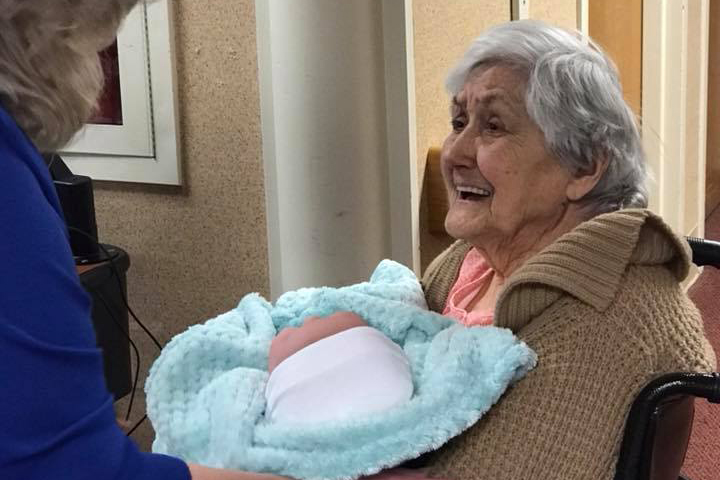For Alzheimer’s patients at a Kentucky nursing home, Valentine’s Day was extra special this year.

Several residents of Park Terrace Health Campus were greeted with dolls and plush puppies as a pick me up on Feb 14. The project, called Pearl’s Memory Babies, was started by a Kentucky woman named Sandy Cambron whose mother-in-law, Pearl, passed away from the disease in 2008. For years, Cambron’s family had been visiting the home with dolls in Pearl’s memory.
After distributing 28 dolls and four puppies, residents lit up with smiles.
READ MORE: New research could help early Alzheimer’s detection
“It’s overwhelming,” Cambron told TODAY. “It’s just great to know that it’s comforting them.”
Cambron’s mother-in-law loved her own doll and kept it by her side until she passed.
Shannon Gray Blair, another volunteer who gave out dolls that day, posted her experience on Facebook. The post, which has now gone viral, shows 21 pictures and videos of the residences quickly responding and falling in love with their new toys.
- Protests grow after shootings by immigration officer in Minneapolis and Portland
- US launches new retaliatory strikes against ISIS in Syria after deadly ambush
- Protesters try to attack driver after truck speeds through L.A. anti-Iran protest
- U.S. DOJ launches criminal investigation into Fed Chair Jerome Powell, he says
“I can promise you that no matter what you got for Valentine’s Day, mine was way bigger and better than anything you could ever imagine,” Blair wrote on the social media site.

“A few weeks ago I told you about my dear friend and co-worker Sandy that gave my mom and her roommate babies. Today she delivered 28 babies and four puppies to mom’s entire unit.”

Get breaking National news
Blair continued she was honoured when she was asked to help, and she had no words of what she experienced that day.
Courtesy of Shannon Gray Blair
Importance of socialization
Nalini Sen, director of research at the Alzheimer Society of Canada, says she understands why people with dementia or Alzheimer’s may be clinging to things like dolls.
READ MORE: Woman with Alzheimer’s surprised every time she meets newborn granddaughter
Sen adds for patients who are used to being in homes or long-term care settings, other forms of therapy using music, pets and art can also be useful.
“Music can be very powerful and reduce agitation and improve behavioural issues in middle stages of dementia,” she continues.
READ MORE: Alcohol among biggest risk factors of early-onset dementia — study
According to the society, there are over half a million Canadians living with dementia. In less than 15 years, this number is expected to increase to 937,000.
Sen adds these types of therapies are also crucial for people who lose their ability to speak over time. For music, in particular, she says some patients will tap along with a beat, sing the lyrics or sing something they heard in their childhood.
And while there isn’t much research on doll therapy, she says, holding, cuddling and interacting with a human-like doll may have some patients engage in conversation.
Courtesy of Shannon Gray Blair
“A sense of a role play factor can be helpful and it’s a great activity in any stage of dementia,” she says. “Having the opportunity to take care or cuddle someone can be comforting.”










Comments